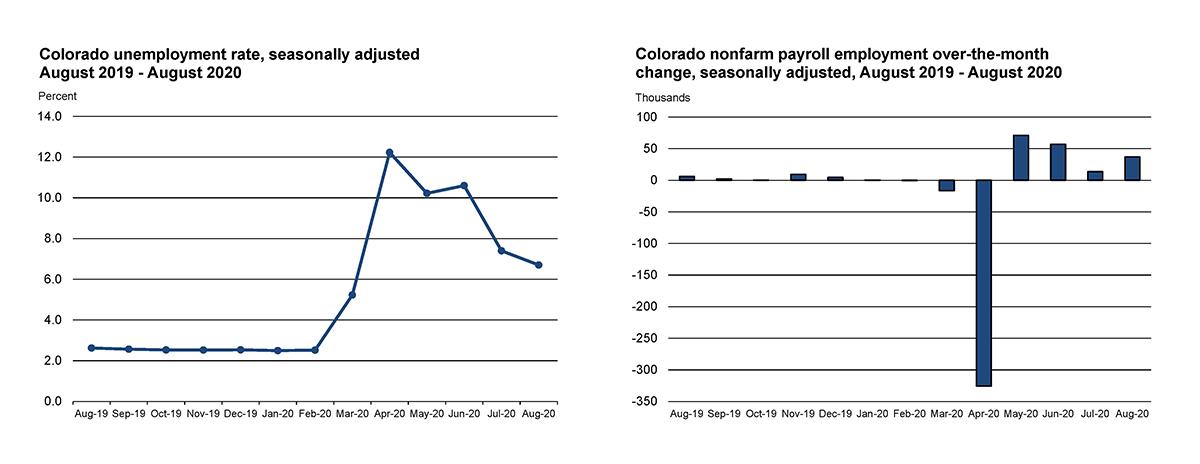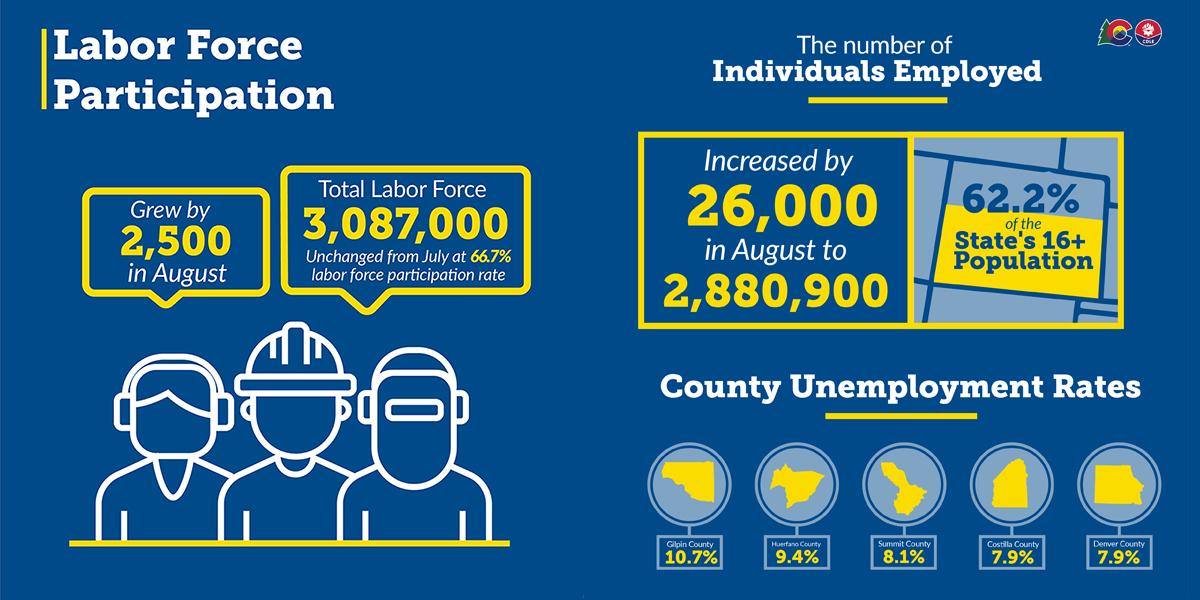For Immediate Release
Date: September 18, 2020
Contact: Office of Government, Policy and Public Relations - cdle_pr@state.co.us
Colorado Employment Situation – August 2020 36,900 Nonfarm Payroll Jobs Added in August; Unemployment Rate Falls to 6.7%
Household survey data
According to the survey of households, Colorado’s seasonally adjusted unemployment rate decreased to 6.7 percent in August from 7.4 percent in July. During the same period, the national unemployment rate declined one and eight-tenths of a percentage point to 8.4 percent.
Other highlights from the household survey:
- Colorado’s labor force increased by 2,500 in August to 3,087,000. The labor force participation rate in August was unchanged from July at 66.7 percent.
- The number of individuals employed in Colorado increased by 26,000 in August to 2,880,900, which represents 62.2 percent of the state’s 16+ population. While Colorado’s employment-to-population ratio continues to improve since April, when it was 58.3 percent, it is still well below the February level of 67.7 percent.
- The Colorado counties with the highest unemployment rates in August were: Gilpin (10.7%), Huerfano (9.4%), Summit (8.1%), Costilla (7.9%), and Denver (7.9%). County-level unemployment rates are not seasonally adjusted and are directly comparable to Colorado’s August unadjusted rate of 6.6 percent.
Establishment survey data
Employers in Colorado added 36,900 nonfarm payroll jobs from July to August for a total of 2,649,600 jobs, according to the survey of business establishments. Private sector payroll jobs increased by 26,500. Government added 10,400 jobs in August, with some of those gains attributable to temporary hiring for the 2020 Census. Since May, Colorado has gained back 178,500 of the 342,300 nonfarm payroll jobs lost between February and April. That translates to a job recovery rate of 52.1 percent, which exceeds the U.S. rate of 47.9 percent.
Other highlights from the establishment survey:
July estimates were revised up to 2,612,700, and the over the month change from June to July was a gain of 13,600 rather than the originally estimated increase of 6,200 (monthly revisions are based on additional responses from businesses and government agencies since the last published estimates).
Private industry sectors with significant job gains in August were: leisure and hospitality (~10,000), education and health services (~7,100), trade, transportation, and utilities (~6,100), and professional and business services (~3,600). There were no significant over the month declines.
Since August 2019, nonfarm payroll jobs have decreased 147,800, with losses totaling 124,200 in the private sector and 23,600 in government. The largest private sector job losses were in leisure and hospitality (~66,300), trade, transportation, and utilities (~18,100), and other services (~10,700). Colorado’s rate of job loss over the past year is -5.3 percent, compared to the U.S. rate of -6.8 percent.
Over the year, the average workweek for all Colorado employees on private nonfarm payrolls increased from 33.6 to 34.2 hours, while average hourly earnings rose from $30.12 to $30.79, over a dollar more than the national average hourly earnings of $29.47.
###
All Colorado estimates from the establishment and household surveys, including greater geographic detail, are available at: http://www.colmigateway.com. Estimates for all states and the nation are available at: http://www.bls.gov.
The September 2020 Colorado Employment Situation will be released at 8:00 AM on Tuesday, October 20, 2020. The full schedule of release dates for calendar year 2020 estimates is available at http://www.colmigateway.com.
###
Technical Notes
This release provides information on industry employment and labor force statistics for August 2020, the most current estimates available from the Colorado Department of Labor and Employment. The reference period for the establishment and household surveys was the pay period or week that includes the 12th of the month. Therefore, this release provides an estimate of Colorado’s employment situation during a continuation of the Governor’s Safer at Home order, which resulted in a return to work for more Coloradans. For Colorado unemployment insurance claims activity and related statistics, visit www.colmigateway.com. For information regarding impacts to Bureau of Labor Statistics data collection and processing during the pandemic, go to www.bls.gov/bls/bls-covid-19-questions-and-answers.htm.
The unemployment rate, labor force, labor force participation, total employment and the number of unemployed are based on a survey of households. The total employment estimate derived from this survey is intended to measure the number of people employed.
Nonfarm payroll jobs estimates are based on a survey of business establishments and government agencies, and are intended to measure the number of jobs, not the number of people employed. Other series based on this survey include private sector average weekly hours, average hourly earnings and average weekly earnings.
The business establishment survey covers about seven times the number of households surveyed and is therefore considered a more reliable indicator of economic conditions. Because the estimates are based on two separate surveys, one measuring jobs by worksite and the other measuring persons employed and unemployed by household, estimates based on these surveys may provide seemingly conflicting results.
###
Supplemental Information | Labor Force Summary August 2020
City Report August 2020 | County report August 2020 | August 2020 Press Release

